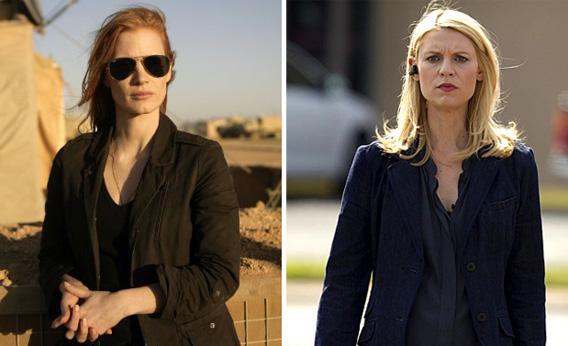Once it was clear that Zero Dark Thirty—the riveting new movie from Kathryn Bigelow about the hunt for Osama Bin Laden—would focus on a young female CIA analyst played by Jessica Chastain, comparisons between her and Carrie Mathison from Homeland were sure to follow. But now having seen the movie—which opens in New York and L.A. on December 19, with a wider release in January—the comparison seems more than just inevitable. It seems almost… uncoincidental?
It’s impossible to know, of course, whether there is any real-life connection between the two characters. But the question was first raised—sort of, anyway—months ago. Back in September, the Daily Mail wondered whether a female CIA operative referred to as “Jen” in No Easy Day, the book about the Bin Laden hunt by one of the Navy SEALs who carried it out, was the inspiration for the character played by Danes on her hit Showtime series. As the paper noted, Danes has said that her character is “loosely modeled on” an actual CIA officer whom she has met at Langley. While there, Danes “met in the hallway the man who was the head of the Pakistani division and had just returned to the U.S. (after the killing of Osama bin Laden).”
Danes doesn’t draw any line between that mission and her character’s (loose) inspiration, and it is possible, of course, that the man just happened to walk by. But the juxtaposition is striking. And though Jessica Chastain’s character is called “Maya” in Zero Dark Thirty—the movie is based on original reporting by screenwriter Mark Boal—she is, in fact, playing the woman referred to as “Jen” in No Easy Day, as she confirmed at a screening attended by a Slate colleague in New York last night. (Both names, of course, are pseudonyms.)
It’s important to note that high-ranking female CIA officers are no longer an anomaly. Though it was only 17 years ago that the agency paid $1 million “to more than 400 women in a class-action suit involving sex discrimination,” women have in the last two decades assumed an increasingly prominent place there. Indeed, when it comes to hunting al-Qaida, they have at times been the norm: The “CIA’s first unit devoted to tracking al Qaeda, known as Alec Station, hired women analysts almost exclusively in the 1990s,” according to a fascinating piece from the Daily Beast published in September. When Alec Station’s first chief, a man, left in 1999, “all of his 14 targeters were women.” (A targeter is “an analyst who pores over grainy drone footage and sorts through phone intercepts and other fragments of intelligence to find the exact location of terrorists, drug traffickers, or arms dealers.”) So the producers of Homeland likely could have had any number of women in mind when they were dreaming up their hero.
Still, the similarities between Carrie and Maya go beyond gender. Though Zero Dark Thirty refers to Maya being recruited to the CIA out of high school, No Easy Day says that she was recruited out of college—like Carrie Mathison. (Details about Maya were “changed or eroded to protect her identity,” which may account for the discrepancy between No Easy Day and Zero Dark Thirty on this score.) Both women are around the same age, in their late 20s or early 30s. Both are professionally devoted to avenging the terrorist attacks of Sept. 11—although Carrie seems more concerned with future attacks, while Maya is focused on getting Bin Laden. Both are presented as unusually sure of their analyses, even in comparison to their CIA colleagues, whose conclusions they confidently upend. Both are often at odds with their superiors.
Carrie is, of course, only “loosely modeled” on an actual CIA officer, so it’s entirely possible that the writers of Homeland did not take these traits from their real-life inspiration, but rather added them to the character in order to propel the narrative of their series. (Carrie’s bipolar diagnosis is, so far as I can tell, added for just that reason.) And if there is any deeper connection between Carrie and Maya, we are not likely to know about it any time soon. Even if there is no such connection, though, it seems remarkable that the most thoroughgoing depictions of the “war on terror” in both television and film are told through the eyes of characters with so much in common.
